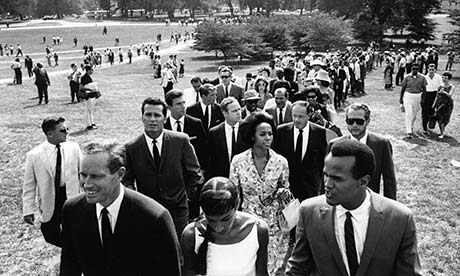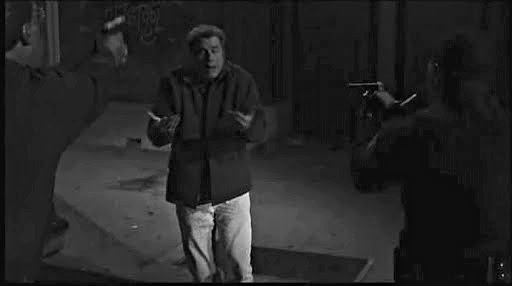An unarmed pedestrian is stopped on the street as a suspect and beaten by cops as a crowd gathers and protests. Unfortunately, that’s increasingly common, except in this scenario, the victim is white, the police African American, and society dominated by black citizens.
That scene is one riveting moment of an overlooked film made timely by recent killings of Michael Brown, Eric Garner and Tamir Rice. The scene is from a motion picture released 20 years ago and starring Harry Belafonte, the keynote speaker at this month’s annual Martin Luther King Jr. Celebration Luncheon Jan. 19 at the Peoria Civic Center, sponsored by Public Employees for Community Concerns.

Harry Belafonte, front right, was at 1963’s March on Washington for Jobs and Freedom with a contingent of celebrities. Also shown are Charlton Heston, James Garner, Diahann Carroll, Paul Newman and Marlon Brando.
Belafonte, an early backer of the Civil Rights Movement and King’s leadership in the struggle, stars in “White Man’s Burden” as the refined Thaddeus Thomas, who owns a chocolate factory employing workers such as Louis Pinnock, the victim of police violence, portrayed by John Travolta.
The movie’s premise is an alternative world in which African Americans have most of the nation’s wealth and power while whites are the underclass. That role reversal of race stereotypes shows various ways race affects people’s actions and attitudes. Seeing it could kindle empathy many have lost.
In 1995, Belafonte told The New York Times, “I haven’t made a movie in 17 years. I had no appetite for the kinds of films made about blacks today that propel violence and romanticize ghetto conditions. Then I read this and thought, ‘At least we have something here that takes a real look at what’s tearing people apart.’”
Empathy is when people identify with, understand and share others’ situations and feelings, to “sense the hurt or the pleasure of another,” as psychologist Carl Rogers said, “as if [you] are hurt or pleased.”
Empathy helps individuals, families, communities and societies hold together, and it helps victims get by and species survive. But some see a decline of empathy.
However, it’s vital. Physician Wes Ulm in Democracy magazine wrote, “Work in both the biological and social sciences has indicated that traits like empathy are elemental to the wiring of animal nervous systems. Our system’s adversarialism has reached a disastrous endpoint, suffocated by ideological polarization, fruitless partisan bickering, and moneyed interests. The result is a fractious, dysfunctional U.S. institutional paralysis.”
Regarding race, that paralysis is arguably evident in how black men are treated.
In “White Man’s Burden,” Travolta’s Pinnock is an inner-city factory worker with a solid work record asked to take a package to his boss’ mansion. Instructed to go to the rear door of the palatial estate, with its gardens, he’s uncertain of directions and happens to glimpse the rich man’s wife getting dressed.
Thomas sees him and leaps to the wrong conclusion, later suggesting that the factory “choose another man” the next time they send someone over. Pinnock is fired.
A loving husband and father of two, Pinnock is forced to a desperate act about the minor misunderstanding and a manager’s overreaction. He drives his beat-up pickup truck to Thomas’ home and abducts him, demanding back pay for all of the overtime hours he’d been required to work off the books.
During the ensuing time together, the two eventually empathize, but it’s too late.
Directed by Japanese-American screenwriter Desmond Nakano (“Last Exit to Brooklyn”), in his directing debut, and produced by Lawrence Bender (“Pulp Fiction”), the movie features Margaret Avery (“The Color Purple”), Kelly Lynch (“Road House”) and Robert Gossett (“Major Crimes”), plus supporting roles by Carrie Snodgrass and Seth Green and music by Howard Shore.
The film is interesting and thought-provoking, if a bit uneven and somewhat disappointing (resorting to Hollywood action-movie clichés). Still, it effectively visualizes many biases, from TV and toys dominated by imagery mirroring the black majority to parallels such as a gang (of white skinheads) and a fawning foreman (ably played by Tom Wright, a veteran TV actor also known for “Barbershop” and “Barbershop 2”). One of the most evocative scenes is the family’s eviction, when they’re given 15 minutes to gather some belongings and leave their home.
Belafonte, a singer/songwriter as well as actor and activist, is sure to give a stem-winder of a speech. His work in “White Man’s Burden” is a memorable set piece to hear his thoughts.
To watch the whole 90-minute film online, go to https://www.youtube.com/watch?v=4lvG52OfykI
Tickets are $40, available by mail from PECC, P.O. Box 1312, Peoria, IL 61654-1312. For details, go online to www.mlkluncheon.com/


